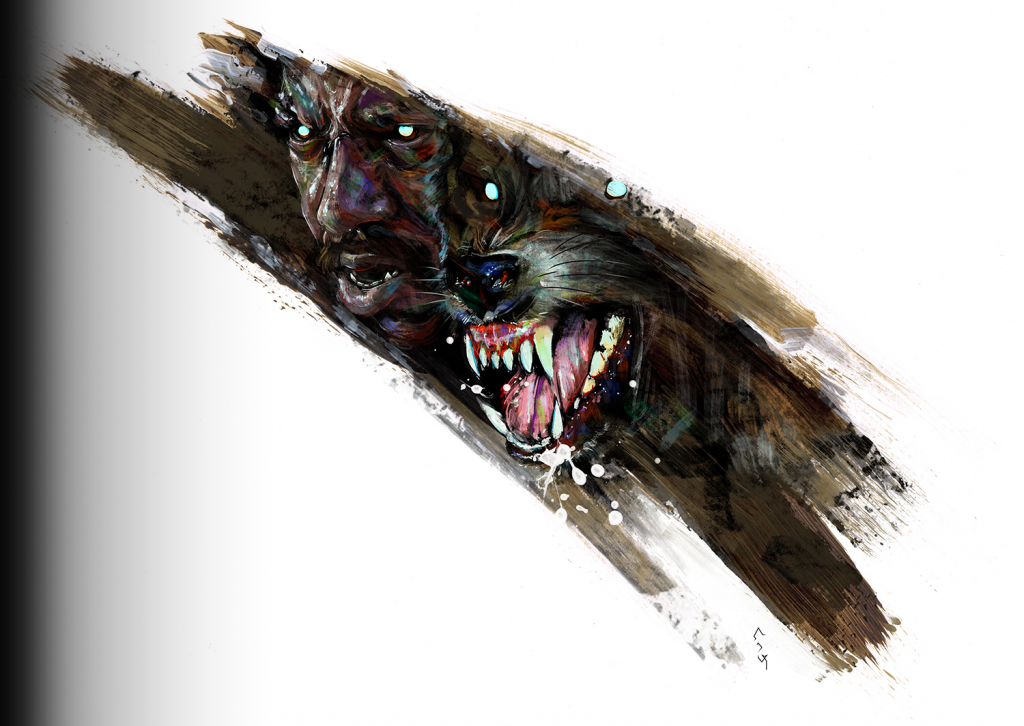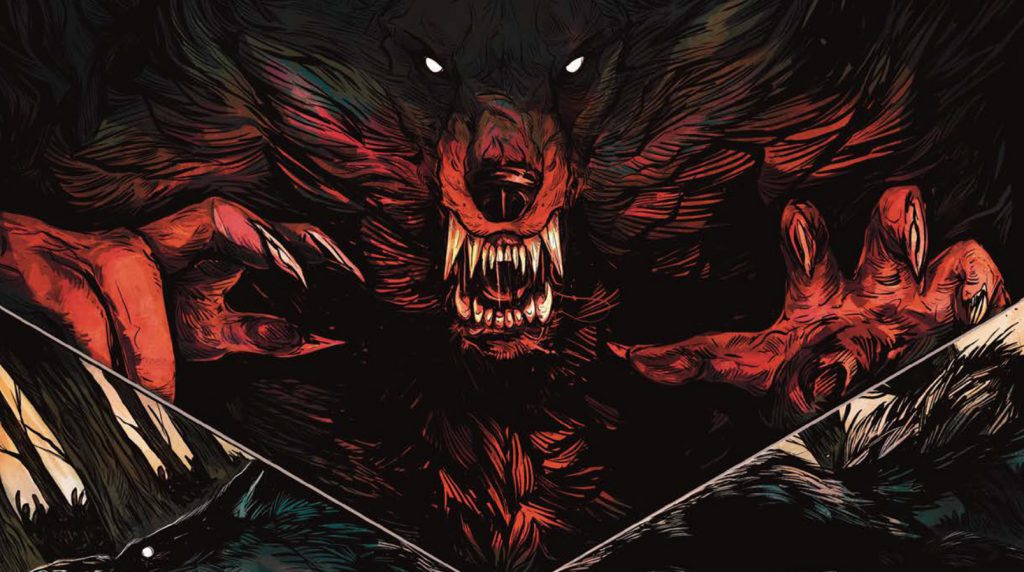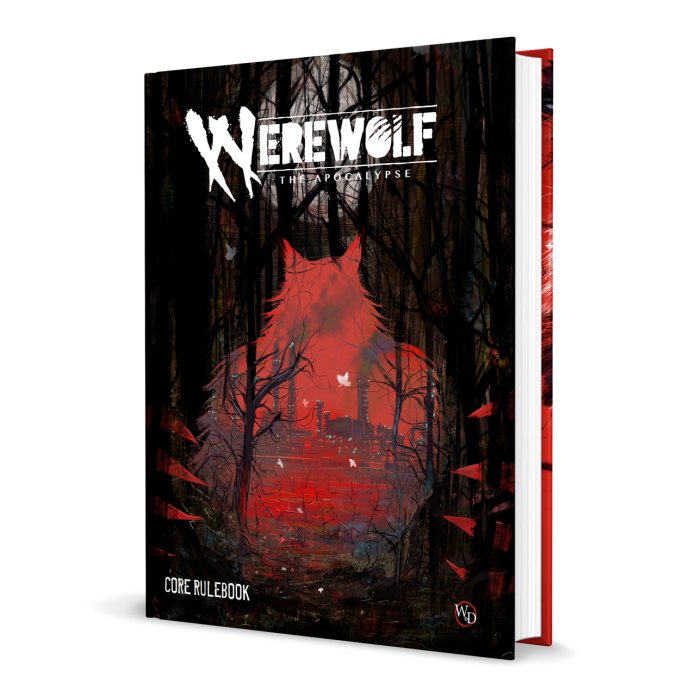Including “the Apocalypse” in the title of the latest edition of Werewolf: The Apocalypse is a bit of a misnomer. The apocalypse is as good as over: the dark forces to corrupt the World of Darkness have won, and all there is left for those that opposed them to do is eke out survival, fruitlessly battling their foes all the while. While previous editions were about fighting an invisible war against destruction, the fifth edition is about an exercise in futility: Capitalism has won, and the world is doomed. That said, Werewolf doesn’t pretend to be something that it isn’t. The core book outright says that the latest entry is not a continuation of older editions of Werewolf, and that fifth edition is something different, for better and worse.
This review is separated into two parts: Werewolf: The Apocalypse as a game, and Werewolf: The Apocalypse as a product. The first part of this review will focus on the game itself, and the second will focus on game design, separating the two specifically for a few critical purposes.

Roll your last pathetic die, Yugi!
Werewolf is best described as fine.
As with other World of Darkness games, the most attention is dedicated to the player characters and their place within the World, far more so than calculating stats or tactical fights. Each werewolf, or Garou, is more defined by their personality and relationships than they are by their stats, and I really like that part of the game. It’s fun to think, not only about your character but the people who surround them– who are their friends? Their enemies? Werewolf does a great job of introducing little nooks and crannies in the world for players to wedge their characters into, creating a whole ensemble cast before character creation is finished. With that said, there is more to creating a character than creating their fiction, and that is where Werewolf falls flat.
Whenever I pick up a new RPG, before I feel comfortable suggesting it to my group or recommending it, I like to create a character. Partially as a test of the character creation process, partially as a way of finding out which bits of fluff inspire me, and partially as a measure of “is this game going to be fun.” Creating a character in Werewolf is a bit of a miserable experience. The process is different than that of the latest editions of Hunter and Vampire in one key aspect: while the other games only really have one major, mechanic defining choice (which Hunter Creed or Vampire Clan) Werewolf has two. First, a player selects an Auspice– in universe, the role in society assigned to your Garou based on when they first change– and your Tribe. There’s more customizability afforded by the two choices, letting you mechanically alter your character to fit with their concept– one of fifty-five different possibilities. This increased complexity is a double-edged sword, however: Specific combinations of Auspice and Tribe unlock and limit some of the Gifts– supernatural abilities– available to each Garou. Gifts are already a bit of a pain to select: Learning about the different options available to you means flipping through nearly fifty pages of Gifts, on top of the separate sections for your Garou’s Auspice and Tribe. It’s not the most annoying character creation process, leagues better than the laborious task of picking spells in Dungeons & Dragons, but it’s not as refined as Paradox’s other titles– the process is reminiscent of the earlier editions, made more frustrating by the awkward chapter layout. The Auspices and Tribes themselves are neat, with Auspices helping shape the Garou’s personality while Tribes shape their archetype. The variety is on point, each Tribe and Auspice is different enough from all the others that each character can feel mechanically distinct, even if they’re from the same Tribe or Auspice.

Apart from character creation, the rules are pretty good, if not extremely derivative of the other World of Darkness titles, especially Vampire. The main mechanics revolve around a pack of werewolves protecting a Caern, a physical manifestation of the state of the surrounding spirit world, while using their special, magical Rage dice. Despite the re-flavoring, it’s more than a little similar to the fifth edition of Vampire, where a coterie of vampires protects their territory while using their special, magical Hunger dice. While Hunter has its, well, hunts to distinguish itself from Vampire, Werewolf feels closer to a hack of Vampire than its own, independent thing. The Gifts aren’t quite a direct parallel to Vampire’s Disciplines– Gifts are individual powers, as opposed to variations on a theme– but the process of using them is virtually identical. This isn’t to say that Werewolf is entirely derivative: The hip new thing is the Harano and Hauglosk systems, five-box countdowns until your Garou falls into a depressed or fanatical state, respectively. It’s an interesting mechanic, but I’m dubious of how often they would come up in play. All in all, it’s the sort of game that is made without taking risks. Perfectly constructed? Nope. But it’s a solid, good game that’s worth a shot.
The Other Side: Cultural appropriation, obliteration, and separation.
“This is a game about monsters. But it is only a game. Don’t use it as an excuse to be a monster yourself.”
If you’re at all interested in Werewolf, you should absolutely go read J.F. Sambrano’s piece (linked here) on their experience working on the game as an Indigenous person and veteran of writing for the World of Darkness. Their descriptions of pre-release content, aborted developmental decisions, and testimony about the anti-Indigenous racism they faced from the White Wolf team paint an incredibly disturbing picture of what Werewolf is, was, and could have been. As it was released before the full release, it doesn’t speak on what made the final cut. Somewhat predictably, if not disappointingly, the released version has not fixed anything.
Earlier, I said that the fifth edition of Werewolf takes no risks in its game design, and the writing is no better. Werewolf has hoovered all of the cultural appropriation of past editions, all of the shoplifted concepts from the cultures and mythos of a half dozen different groups– Indigenous American, Norse, and Irish cultures all come to mind– and spat it out in a homogenous slurry of Eurocentric stuff, all of which is (im)perfectly separated from its source. While the representation (and I hesitate to call it that) in past editions was more often than not appropriative, racist, and uncomfortable, it presented a perfect opportunity for Paradox: To take all of those influences and lean into them, to actually listen to people from those cultures and make it into true representation. Somehow, rather than trying at all to update Werewolf to be properly inclusive, they decided to can it all, not even giving themselves the chance to do a kick-flip and land it or scrape their knee. The Get of Fenris are no longer a Nordic-themed Tribe, they are merely another victim in the alt-rights’ conquest of Norse culture. The Indigenous-themed Tribes have vanished into the aether, the issue of their problematic names “resolved” by removing them entirely. The Irish-themed Tribe has been adapted into a nature-themed Tribe. The matriarchal, feminist Tribe is gone. The Metis, another disgustingly inappropriate name, have been thrown out along with any disabled Garou. This isn’t to say they’ve gotten rid of any of the cultural references, just that they’ve disconnected them, thoroughly, from their origin. The apocalypse is over in Werewolf: the Apocalypse. The capitalists won, destroying nature and the Garou in their path. At least they got a few shots in at Elon Musk, in between their proclamations that an abundance of capital isn’t inherently bad.
The Verdict
All in all, the game is solid. It’s pretty good and could be fun with the right group of people. Nothing is made in a vacuum, however, and the disgusting racism and cultural theft baked into the core of the game’s writing makes it much more difficult to recommend. Once more, please please please read J.F Sambrano’s piece on their experiences, as it is an invaluable peak behind the scenes and gets into the problems inherent to Werewolf much more deeply. Good night and watch out for werewolves. Or worse, capitalists.


